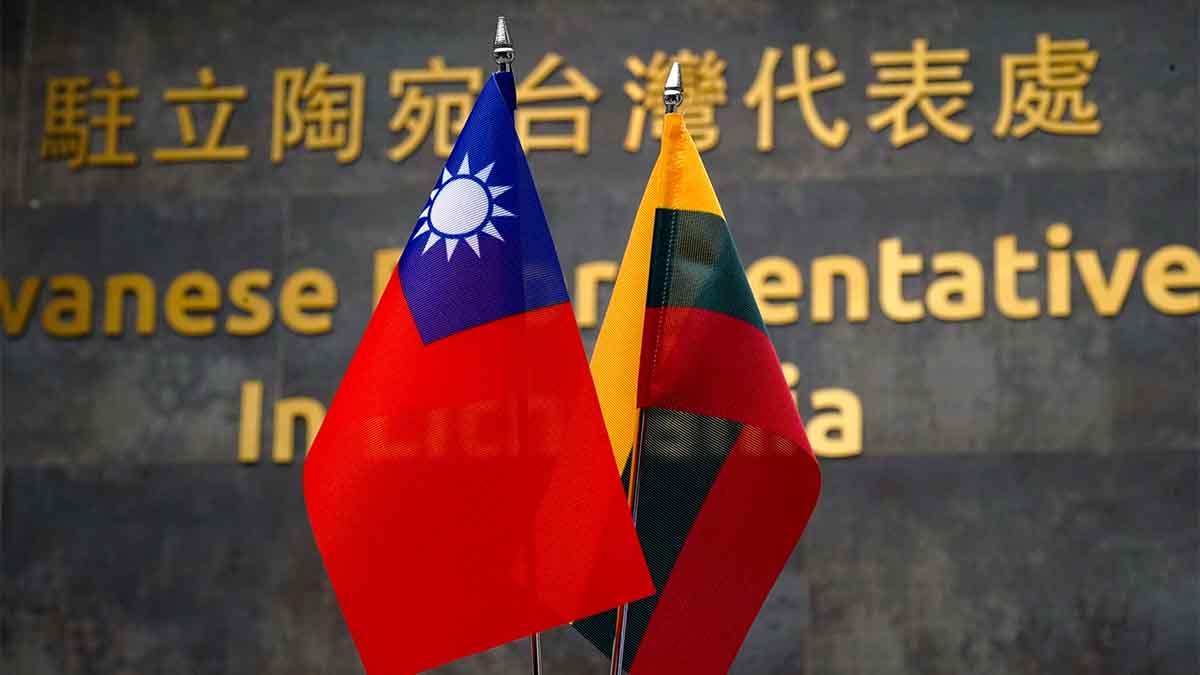China has strongly condemned Lithuania’s recent decision to expel three Chinese diplomats stationed at the Office of the Charge d’Affaires, labelling the move as “wanton and provocative.” Beijing also warned of potential countermeasures to safeguard its sovereignty and diplomatic interests.
Root of tensions: Taiwan’s Representative Office
The latest diplomatic fallout builds upon a series of disputes rooted in Lithuania’s decision in 2021 to allow Taiwan to open a representative office under its name. Unlike similar offices in other countries that use the title “Taipei”, Lithuania permitted the use of “Taiwan”, which Beijing perceived as a direct challenge to its sovereignty.
China, which views Taiwan as an inseparable part of its territory, responded to Lithuania’s move with a series of punitive measures. It downgraded diplomatic relations with the Baltic state to the level of chargé d’affaires and pressured multinational corporations to reduce ties with Lithuania. Lithuania also recalled its ambassador from Beijing, signalling a significant diplomatic rift.
In Monday’s statement, the Chinese Foreign Ministry accused Lithuania of violating the One-China Principle and reneging on commitments made during the establishment of diplomatic ties. A ministry spokesperson declared that Lithuania had acted in serious violation of the political commitments outlined in the communiqué on the establishment of China-Lithuania diplomatic relations, causing severe difficulties for bilateral ties.
Diplomatic expulsions
Lithuania’s decision to expel the three Chinese diplomats adds another layer to the already tense relationship. While the Lithuanian Foreign Ministry cited violations of the Vienna Convention and domestic laws as reasons for the expulsions, it did not provide specific details. The Vienna Convention governs diplomatic conduct and outlines legal protections and responsibilities for diplomats in foreign nations.
Impact Shorts
More ShortsBeijing, for its part, has strongly refuted the accusations and demanded a reversal of Lithuania’s decision. The Chinese Foreign Ministry reiterated that it reserves the right to take countermeasures, further raising concerns about the trajectory of the bilateral relationship.
Baltic Sea cable incident
The expulsions come against the backdrop of another contentious issue—the recent severing of two telecommunications cables in the Baltic Sea including one connecting Lithuania to Sweden. A Chinese ship, Yi Peng 3, has come under suspicion for its proximity to the damaged cables during the time of the incident.
Lithuania, along with Sweden and Finland, has initiated a joint investigation into the cable damage with support from Eurojust, the European Union’s criminal justice cooperation agency, an AFP report said. Although no direct evidence has linked the Chinese vessel to the incident, suspicions have further strained relations between Vilnius and Beijing.
China has denied any involvement in the cable damage and expressed its willingness to cooperate with the ongoing investigation. However, the timing of the incident, coupled with Lithuania’s diplomatic measures, highlights the growing mistrust between the two nations.
Lithuania’s strategic alignment
The Baltic nation has increasingly positioned itself as a staunch advocate of democratic values and a critic of authoritarian regimes, aligning closely with Western powers. Vilnius has strengthened its ties with the US and the European Union, actively supporting Taiwan’s international presence and condemning China’s policies in regions such as Hong Kong and Xinjiang. This assertive stance has drawn praise from some Western allies but has also made Lithuania a focal point of Beijing’s ire.
Despite the economic and diplomatic pressures exerted by China, Lithuania has shown resilience and went ahead to expel the Chinese diplomats to assert its sovereignty and safeguard its national security interests.
China’s response
China reiterated its adherence to the One-China Principle as a non-negotiable aspect of its foreign relations, accusing Lithuania of deliberately undermining this consensus.
In its Monday statement, China called on Lithuania to cease its provocative actions and create conditions conducive to the normalisation of bilateral relations. The Chinese Foreign Ministry also expressed hope that Lithuania’s upcoming new government would adopt a more pragmatic approach to diplomacy, respecting international norms and commitments.
However, Beijing’s warning of potential countermeasures adds an element of uncertainty to the future of China-Lithuania relations. Such measures could include economic sanctions, further diplomatic downgrades, or restrictions on Lithuanian companies operating in China. As Lithuania continues to assert its foreign policy independence and as China seeks to defend its core interests, the international community will watch closely for signals of reconciliation—or further escalation.
)